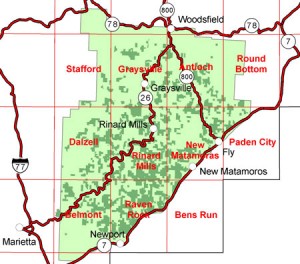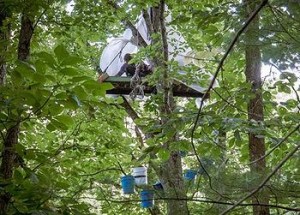From an Article by Michael Kelly, OH Marietta Times, September 6, 2018
The withdrawal of two mineral leases set to be auctioned later this month in the Wayne National Forest was received with relief from an organization that had protested the proposal and frustration from the state trade organization for oil and gas interests.
The two plots, one of 35 acres and the other about 40 acres, are in Monroe County, and the mineral leases were scheduled for auction Sept. 20, according to an announcement in July by the Bureau of Land Management. The BLM announced Aug. 28 that the auction was canceled, citing Title 43 Code of Federal Regulations, paragraphs 3120.1-3, but offering no further explanation.
That part of the code refers to suspending the offering of a parcel while an appeal is under consideration.
Wendy Park, a senior lawyer for the Center for Biological Diversity, said Wednesday that her organization’s protest was the only one she could find that was lodged against the lease offering. She said the center opposed the lease because of its potential impact on nearby water bodies and settled areas.
“This is the first time the feds have pulled parcels from a Wayne National Forest lease auction after approving its fracking plan for the Wayne, in response to environmentalists’ concerns,” she said.
When the 400,000 acres of the Wayne National Forest was opened to oil and gas extraction leasing in 2016, she said, the environmental impact examination was general rather than site specific, and the leases offered since then have not taken local conditions into account.
“This is pretty much what we’ve been saying in all our protests, that they’re not taking a hard look at the impact of fracking on site-specific resources,” she said. In addition to endangered species of bats, she said, there also are public health and cultural concerns.
“There are homes and communities near these leases, and toxic chemicals and air pollution would certainly have an impact on the health of local residents,” she said. “They also have failed to comply with the obligation to make sure cultural and historical resources are not harmed.”
The Ohio Oil and Gas Association, however, was not pleased by the decision, and its spokesman Mike Chadsey said the association members are frustrated with the federal government.
“The landowners are waiting for their minerals to be produced, and although about 90 percent of the minerals are under privately owed land, in order to get to some of that we have to go through public lands with horizontal (drilling),” he said. “Obviously, we are frustrated when sales are pulled, regardless of whether it’s two parcels or 200.”
Chadsey added that failure to offer mineral extraction comes at a price for public institutions such as school districts. “The other piece of this, especially in Monroe County, is the schools,” he said. “Geographically, about half the county is in the Wayne.
School districts that include federal lands receive payments in lieu of taxes, but when minerals are developed on those lands, the districts also receive production royalties, which can significantly increase their revenue.
“All you have to do is look at (private land mineral development in) Belmont or Jefferson counties, they have some monster wells, production is off the charts,” he said. “Even if a lease is offered (by the federal government) there are always delays in issuing permits. Why invest when you don’t know whether you’ll get a permit in 90 or even 120 days? If I had a lease today, I don’t know whether I would get a permit even in a year.”
Mineral payments to counties from production royalties in the Wayne amounted to nearly $1.5 million, according to the U.S. Forest Service.
####################
Two (2) New Protesters Take to Trees in Va. to Stop Mountain Valley PipelineBrief Opinion Report, Marcellus Drilling News, September 6, 2018
We thought we had seen the last of Big Green protesters with names like “Ink,” “Sprout,” “Red,” “Nutty,” “Fern” and “Decard” illegally sitting in the tops of trees (or on poles) in Virginia as a tactic to prevent Mountain Valley Pipeline (MVP) from cutting trees along the path of the pipeline. Nope. We have two more: “Lauren” and “Nettle.” Two youngsters (early 20s) have built themselves a make-shift tree house in Montgomery County, VA. – in the path of trees that are due to be cut down for MVP.
Draping a banner that says, “No Prisons, No Pipelines,” the two say they pick and choose which laws they want to obey. They don’t agree with the law that says EQT Midstream has the right to build MVP, so they’re illegally attempting to stop it. As near as we can tell, they’ll have a long wait. Due to federal laws protecting bats and other so-called endangered species, MVP can’t cut those trees until November. At least that’s our understanding. At any rate, we now have two more protesters who will need to be starved or otherwise forced out the trees. When that finally happens (as it will), the police need to send a bill for their services to the protesters, not MVP…



{ 1 comment… read it below or add one }
Don’t let feds weaken the rules for pipelines | Letter
Letters to the Editor, Trenton NJ Express-Times, August 27, 2018
Signs protesting against PennEast are posted at the entrance of the Baldwin Lake Wilderness Management Area at a protest event in 2014. (Mary Iuvone | For The Times)
One of the most important tools in battles to stop unnecessary pipelines is the 401 Water Quality Certificate. The Clean Water Act gives power to states to certify that pipeline projects don’t pollute waterways. It’s something the Federal Energy Regulator Commission can’t get around.
Now Congress wants to block states from using this certificate to fight pipelines. This is shameful behavior by Washington’s fossil fools to help the gas industry. We need our House members and senators to block attempts to pass this disastrous legislation.
The 401 Water Quality Certificate has been the most successful tools in preventing pipelines. New York denied a 401 permit for the proposed Constitution Pipeline; the Island East pipeline was stopped in Connecticut. Both decisions were upheld in court. In New Jersey, we are using the 401 Certificate for stopping dangerous pipelines, including PennEast, from being built.
Even if Congress passes this terrible bill, we can still stop pipelines with our wetlands rules, which we have federal authority for, and flood hazard rules. However, former Gov. Chris Christie weakened both rules to make it easier to build pipelines.
Under pre-Christie rules, it was much harder to get the necessary individual permits since they had to prove need and no impact to streams or wetlands. His changes including making them general permits, which declares there is no impact. These are much easier for pipeline companies to obtain.
Gov. Phil Murphy must fix these rules and strengthen them to protect our clean water and protect us against pipelines.
Jeff Tittel, Director
New Jersey Sierra Club, Trenton
Source: https://www.lehighvalleylive.com/opinion/index.ssf/2018/08/_letter_377.html